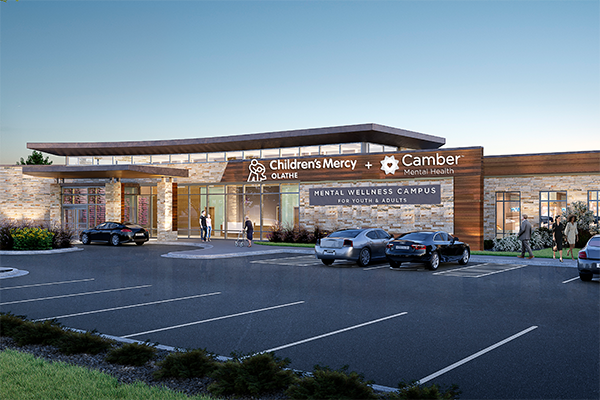- Locations
- How We Help
Overview
As the regional leader in youth mental health treatment, our innovative services help youth achieve health and wellness.
Treatment Programs
- Admissions
Overview
Learn how to admit your child to a Camber treatment location or make a client referral.
- Youth Disorders
- Resources
Overview
Our free resources help you stay informed and educated about mental health, brain development, and childhood trauma as well as how Camber is working toward building healthier communities.
- About Us
Overview
Our philosophy is to provide collaborative, compassionate and effective care through the use of timely, individualized treatment planning.
Learn More About Us
Disruptive Mood Dysregulation
 Disruptive Mood Dysregulation Disorder (DMDD) is a condition that causes a child or teen to frequently feel very irritable or angry and often results in a temper and outbursts that are much larger than the situation warrants. For example, having a verbal or physical outburst about spilling a glass of milk. Their responses to situations are often much bigger than what is appropriate for their age and developmental stage.
Disruptive Mood Dysregulation Disorder (DMDD) is a condition that causes a child or teen to frequently feel very irritable or angry and often results in a temper and outbursts that are much larger than the situation warrants. For example, having a verbal or physical outburst about spilling a glass of milk. Their responses to situations are often much bigger than what is appropriate for their age and developmental stage.
Most children and teens experience different moods and ups and downs throughout the day but DMDD goes much further than the occasional “moodiness” and youth with DMDD struggle to regulate their emotions. If a youth has DMDD, they are experiencing severe struggles with their behavior that may require professional support for regulation.
![]()
Signs and Symptoms
For most children, DMDD symptoms begin before age 10. A child with this disorder will most likely experience one or more of the following:
- Acting irritable and/or angry most of the day, nearly every day
- Frequent, severe tantrums (verbal and/or physical) that occur multiple times per week and do not match the severity of the situation
- Challenges functioning at home, in school and/or in relationships due to irritability or anger
What You Can Do to Help
- Seek professional help. It’s important to have a physician or licensed mental health professional examine the child for an accurate assessment and diagnosis of their physical and mental health.
- If the child expresses thoughts of self-harm, suicide, or violence against another person, call 911 immediately. Take these statements very seriously and get them professional help as soon as possible.
- Encourage the use of coping skills that will help the child regulate their emotions (i.e., deep breathing, meditation, exercise, listening to music, etc.).
- Work closely with the child’s teachers and school guidance counselors to ensure everyone knows how to best support the child.
- Join a training for parents/caregivers to learn skills for managing difficult behaviors in children.
- Be observant of their behaviors and help them keep track of when feelings of anger and irritability occur. Tracking this over time can help identify triggers, what treatment approaches are most effective or any additional concerns.

Camber Children’s Mental Health Can Help
Camber is a network of nonprofit children’s mental health hospitals and residential treatment centers serving youth ages 6 to 18. Each year, we give thousands of youth a safe place to heal, build resilience, and overcome struggles with mental health conditions. Our compassionate team of psychiatric, medical and behavioral health professionals provides a nurturing and therapeutic experience along with a treatment plan tailored to meet each child’s individual needs. The goal of our treatment programs is for each child to safely return home with the resources and supports in place to live a healthy and happy life in their community.
If you’re concerned that a child in your care is struggling with Disruptive Mood Dysregulation Disorder (DMDD) or other mental health needs, call Camber at 913-890-7468. We’re available 24/7 to answer your questions.
Here are some Camber resources to help you understand and address DMDD:
- Learn about the 3 most common levels of mental health treatment for children & teens
- Check out mindfulness and how it can prevent impulsive, reactive responses [VIDEO]
- Make an emotion regulation plan to identify triggers and helpful coping skills for when emotions become overwhelming
- Have fun and be active! Follow along with these simple exercises [VIDEO]
- Take this quick assessment to determine if your child might need professional mental health treatment
- Use these easy deep breathing techniques when feeling overwhelmed [VIDEO]
- Get more info on mood disorders like DMDD, major depression and more
Here’s a list of additional resources you can contact for help:
- Call the child’s primary care physician or your local community mental health center
- Text HOME to 741741 for 24/7 support from the Crisis Text Line
- Call the National Alliance on Mental Illness helpline at 800-950-6264 or visit their website at nami.org
- Visit the Anxiety & Depression Association of America website at adaa.org
Share this information with your support system! View and download this information as a PDF.




